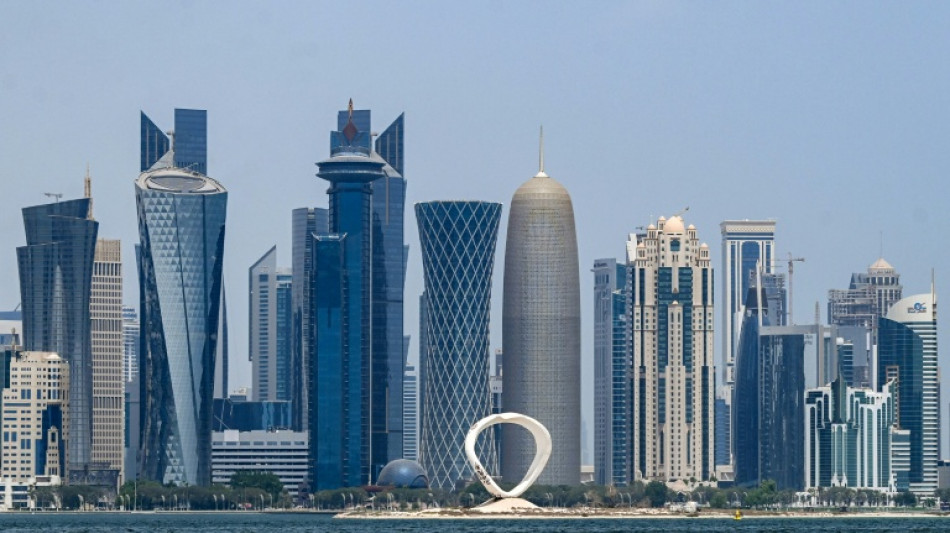
Arab, Muslim leaders urge review of Israel ties after Qatar attack

Arab and Muslim leaders called for a review of ties with Israel after emergency talks in Doha on Monday following last week's deadly strike on Hamas members in the Qatari capital.
The Arab League and Organisation of Islamic Cooperation joint session, which brought together nearly 60 countries, sought to take firm action after Israel's attack on Qatar-hosted Hamas officials as they discussed a Gaza ceasefire proposal.
A joint statement from the summit urged "all States to take all possible legal and effective measures to prevent Israel from continuing its actions against the Palestinian people", including "reviewing diplomatic and economic relations with it, and initiating legal proceedings against it".
Qatar's fellow Gulf nations the United Arab Emirates and Bahrain, along with Egypt, Jordan and Morocco, were among those present that recognise Israel.
The leaders of the UAE, Bahrain and Morocco, which signed the Abraham Accords recognising Israel five years ago to the day, did not attend Monday's talks, sending senior representatives instead.
The statement also urged member states to "coordinate efforts aimed at suspending Israel's membership in the United Nations".
US Secretary of State Marco Rubio will arrive in Qatar on Tuesday, after pledging "unwavering support" for Israel's goal of eradicating Hamas during a visit to the country.
The attack strained ties between Washington and key allies in the Gulf, raising concerns over US security guarantees in a region housing major US assets including a major military base in Qatar.
The State Department said Rubio would "reaffirm America's full support for Qatar's security and sovereignty" after last week's strike.
- Mounting pressure over Gaza -
Qatar had called for a coordinated regional response after the Israeli attack, which stunned the usually peaceful, wealthy peninsula.
The summit aimed to pile pressure on Israel, which is facing mounting calls to end the war and humanitarian crisis in Gaza.
The host country's emir, Sheikh Tamim bin Hamad Al Thani, accused Israel of trying to scupper ceasefire talks by firing on Hamas negotiators in Qatar, a key mediator.
Hamas says top officials survived last week's air strike in Doha, which killed six people and triggered a wave of criticism.
"Whoever works diligently and systematically to assassinate the party with whom he is negotiating, intends to thwart the negotiations," the emir told the summit.
Crown Prince Mohammed bin Salman, Saudi Arabia's de facto ruler, was among those present on Monday, as were Iranian President Masoud Pezeshkian, Iraqi Prime Minister Mohammed Shia al-Sudani, Turkish President Recep Tayyip Erdogan and Palestinian president Mahmud Abbas.
"Tomorrow, it could be the turn of any Arab or Islamic capital," said Pezeshkian, whose country fought a 12-day war with Israel in June, at one point attacking a US base in Qatar in retaliation for strikes on its nuclear facilities.
"The choice is clear. We must unite."
President Abdelfattah al-Sisi of Egypt, the first Arab country to recognise Israel, warned its attack in Qatar "places obstacles in the way of any opportunities for new peace agreements and even aborts the existing peace agreements with countries in the region".
Israel and its main backer Washington have been trying to expand the Abraham Accords, signed during US President Donald Trump's first term, notably courting Saudi Arabia.
Turkish President Recep Tayyip Erdogan accused Israel of adopting a "terrorist mentality", as countries took turns slamming it over Gaza.
The rich Gulf countries also met on the sidelines of the summit, urging the US to use its "leverage and influence" to rein in Israel, Gulf Cooperation Council Secretary General Jasem Mohamed Al-Budaiwi told a press conference.
L.A.Adams--TNT